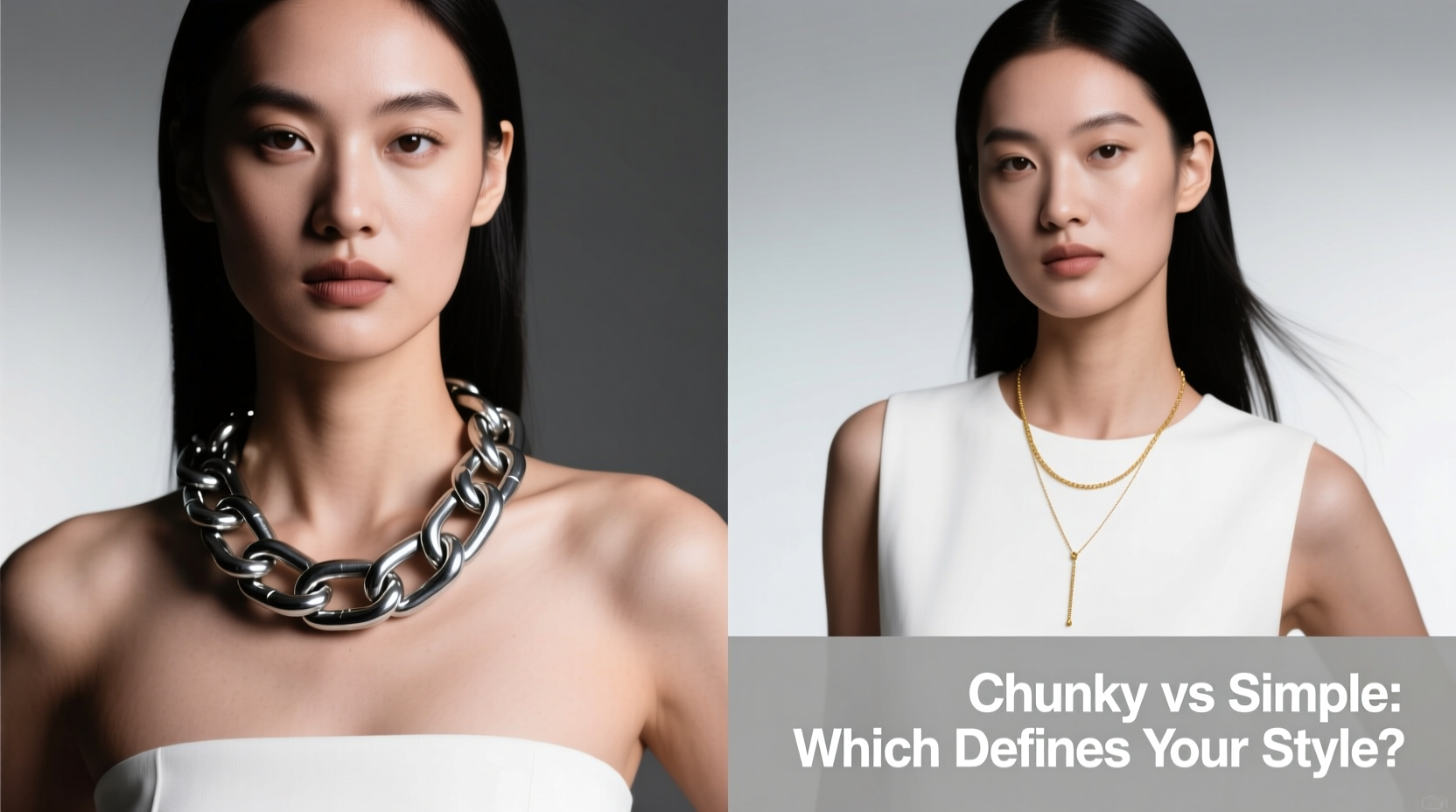Jewelry is more than an accessory—it’s a statement. Among the most enduring pieces in any wardrobe are chain necklaces. But with two dominant styles—chunky and simple—the question arises: which one suits modern taste, and more importantly, which one should you be wearing? The answer isn’t about trends alone; it’s about context, personal style, and intention. Whether you're dressing for impact or understated elegance, understanding the strengths of each can elevate your look.
The Rise and Resurgence of Chunky Chain Necklaces

Chunky chain necklaces have cycled through fashion history with remarkable resilience. From 1980s power dressing to Y2K streetwear, oversized gold and silver links have symbolized boldness, confidence, and luxury. In recent years, they’ve returned with renewed vigor, championed by celebrities like Rihanna, Bella Hadid, and Harry Styles. Designers such as Balmain, Gucci, and Chrome Hearts have featured exaggerated chains on runways, reinforcing their status as high-fashion staples.
What makes chunky chains compelling today is their versatility in attitude. A thick Cuban link or a wide Figaro chain can transform a plain t-shirt into a statement outfit. They work particularly well in minimalist wardrobes where one standout piece carries the visual weight.
When a Chunky Chain Makes Sense
- Dominant focal point: When your outfit lacks texture or color variation, a heavy chain draws attention upward and adds dimension.
- Casual or streetwear styling: Chunky gold or silver chains complement oversized silhouettes, denim jackets, and urban aesthetics.
- Confidence-driven looks: These necklaces project self-assurance and are ideal for events where you want to stand out.
“Bold chains aren’t just accessories—they’re armor. They change how people perceive you before you speak.” — Marcus Lin, Fashion Stylist & Creative Director at Mode Studio
The Quiet Power of Simple Chain Necklaces
In contrast, simple chain necklaces—delicate cable, box, or snake chains—embody subtlety and refinement. Often worn solo or layered in multiples, they appeal to those who favor timeless elegance over trend-driven choices. A fine gold or platinum chain pairs effortlessly with professional attire, evening gowns, or even athleisure, offering polish without dominance.
Their strength lies in adaptability. A 14k gold curb chain measuring 1.5mm can transition from a board meeting to dinner seamlessly. Unlike chunky versions, simple chains rarely clash with other accessories and allow pendants to take center stage.
Advantages of Minimalist Chains
- Everyday wearability: Light, comfortable, and unlikely to snag on fabrics.
- Layering potential: Mix different lengths and textures for a curated, personalized look.
- Timelessness: Less influenced by fleeting trends, making them long-term investments.
Comparative Breakdown: Chunky vs. Simple Chains
| Feature | Chunky Chain | Simple Chain |
|---|---|---|
| Style Vibe | Bold, edgy, statement-making | Subtle, elegant, refined |
| Best For | Streetwear, parties, fashion-forward outfits | Office wear, formal events, daily wear |
| Maintenance | More prone to tangling and scratches; requires careful storage | Easier to maintain; less surface area for damage |
| Cost (Average) | Higher due to metal volume and craftsmanship | Lower to moderate; varies with material purity |
| Lifespan | Long if cared for; heavier chains may stretch over time | Very durable; fine chains less likely to deform |
| Trend Relevance (2024) | High—currently in mainstream fashion cycles | Stable—perennially in style across decades |
How to Choose Based on Your Lifestyle
Selecting between chunky and simple chains shouldn’t hinge solely on what’s trending. Consider your daily routine, personal aesthetic, and comfort level with visibility.
- Assess your wardrobe: If you lean toward neutral tones, structured fits, or monochrome palettes, a chunky chain can add necessary contrast. If your closet is already vibrant or pattern-heavy, a simple chain prevents visual overload.
- Evaluate your profession: Corporate environments often favor discretion. A thin rope chain under a button-down is appropriate; a 10mm Cuban link might not be.
- Think about occasions: Own both? Rotate based on intent. Wear chunky chains for nights out, concerts, or creative gatherings. Save delicate chains for weddings, interviews, or quiet dinners.
- Consider body type: Heavier chains suit broader shoulders and larger frames. Slender builds often balance better with finer chains to avoid being overpowered.
- Factor in maintenance: Thick links trap dirt and require regular cleaning. Delicate chains are easier to care for but more vulnerable to snapping if caught frequently.
Mini Case Study: Olivia’s Jewelry Evolution
Olivia, a 32-year-old graphic designer in Brooklyn, initially gravitated toward chunky gold chains after seeing them on Instagram influencers. She bought a 6mm Cuban link, excited to emulate the bold aesthetic. However, she quickly noticed discomfort during long workdays and found it clashed with her vintage blouses and cardigans. After six months, she sold it and invested in a 1.8mm Italian box chain in recycled gold. “It feels like me,” she said. “I can wear it every day, and it doesn’t fight with my clothes. It’s part of my identity now, not just a trend.” Her experience reflects a growing shift: personal alignment over viral appeal.
Expert Insight: Why Balance Matters
Fashion evolves, but personal style endures. Experts emphasize that the best jewelry choices reflect individuality, not just current runway themes.
“The most stylish people don’t follow trends blindly. They mix statement pieces with classics. A man with a tailored suit and a subtle curb chain? Powerful. A woman in a slip dress with three layered delicate chains? Timeless. It’s about harmony.” — Lena Torres, Jewelry Editor at *Vogue* Accessories
Frequently Asked Questions
Are chunky chain necklaces still in style in 2024?
Yes, chunky chains remain highly fashionable in 2024, especially within streetwear, gender-fluid fashion, and red carpet looks. However, their popularity is peaking rather than rising, suggesting a gradual return to more balanced proportions in the next few seasons.
Can I wear a chunky chain every day?
You can, but consider practicality. Heavy chains may cause neck strain over time, are harder to clean, and can be impractical for active lifestyles. If daily wear is your goal, opt for a medium-weight chain (3–4mm) for durability and comfort.
Is a simple chain a better investment than a chunky one?
It depends on your values. A simple chain made of high-purity gold or platinum is typically more versatile and enduring, making it a smarter long-term investment for most people. Chunky chains can appreciate in value if crafted by luxury designers or using substantial metal weight, but they’re more susceptible to style obsolescence.
Step-by-Step Guide: Building a Balanced Necklace Collection
- Start with a foundation: Purchase one high-quality simple chain in a metal that matches your skin tone (e.g., yellow gold for warm undertones, white gold for cool).
- Add a mid-weight option: Choose a 3mm–4mm chain that bridges the gap—visible but not overpowering.
- Incorporate a statement piece: Invest in one chunky chain you truly love, ideally with secure clasp mechanisms and solid construction.
- Experiment with layering: Test combinations at home. Avoid more than three chains unless they vary significantly in length and thickness.
- Maintain them properly: Clean monthly with mild soapy water, store separately in soft pouches, and have clasps inspected annually.
Conclusion: Style Is Personal, Not Prescriptive
Chunky and simple chain necklaces each hold distinct places in modern fashion. One commands attention; the other earns admiration through restraint. Rather than asking which is “better,” ask which serves you best—today and over time. Trends come and go, but true style emerges from knowing when to shine boldly and when to whisper elegance. Build a collection that reflects your life, not just the moment.









 浙公网安备
33010002000092号
浙公网安备
33010002000092号 浙B2-20120091-4
浙B2-20120091-4
Comments
No comments yet. Why don't you start the discussion?